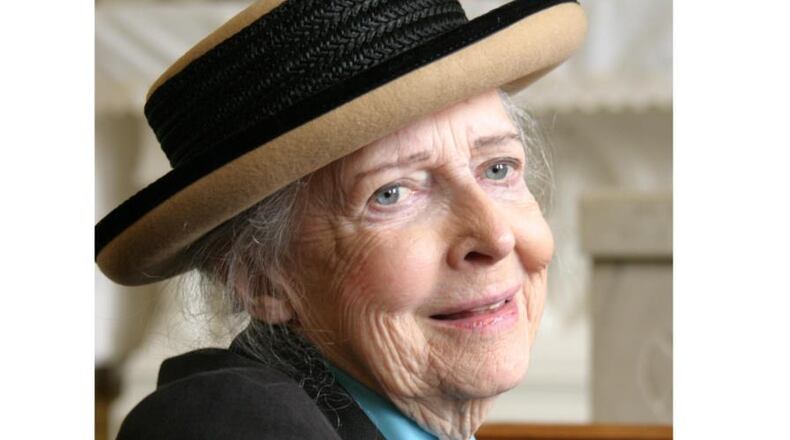Louise Florencourt was small in stature but terrifying in reputation.
Scholars who tried to pursue studies of the noted Georgia writer Flannery O’Connor often found a diminutive, elegant, steel magnolia standing in their way.
“Many a doctoral dissertation or book was held up because of Louise’s keeping of the gate, so to speak,” said Sarah Gordon, professor of English emerita at Georgia College & State University in Milledgeville, and former editor of the GCSU publication the “Flannery O’Connor Review.”
Florencourt, 97, died at her Milledgeville home July 31, still in command of her senses and having only recently relinquished her title as trustee of the Mary Flannery O’Connor Charitable Trust. In that role she evaluated requests from scholars to study unpublished manuscripts and letters, as well as requests from producers to create movie, television and theatrical versions of O’Connor stories.
She often found those supplicants unsatisfactory.
A case in point would be the effort she made to stop Father Mark Bosco from reading a paper on the letters between O’Connor and a Danish book salesman named Erik Langkjær who was O’Connor’s only brief fling.
Bosco, a Jesuit priest, was also an O’Connor scholar, and is now vice president for mission and ministry at Georgetown University.
“It was the first time we were going to hear aloud those 12 letters,” said Bosco, “and she was determined that I was not going to do that.” So, the organizers of the Milledgeville conference kept Bosco out of sight at a Chic-fil-A until he spoke. “I wondered why is everyone so afraid of this woman?” said Bosco.
“She came up to me afterwards very upset, got her finger in my face and said ‘You had no right to do this’.”
Though the two got off on the wrong foot, Bosco and his co-producer Elizabeth Coffman, eventually won Florencourt over, and with her help made the 2020 documentary film, “Flannery: The Storied Life of the Writer from Georgia.”
“I think she felt that keeping tight control on Flannery’s things was her responsibility,” said Louise’s younger sister Frances Florencourt, of Arlington, Massachusetts. “Some people criticized her for that, but I think she did the right thing.”
Credit: Family photo
Credit: Family photo
O’Connor lived most of her life in Milledgeville, attending college (at a GCSU predecessor) and graduate school at the University of Iowa. After being crippled by lupus as a young adult she returned to Milledgeville, staying with her mother at the family’s Andalusia Farm, and writing most of her work there, including the short story collection that introduced her to the world, “A Good Man is Hard to Find.” She died in 1964 at age 39.
O’Connor’s stories were distinguished by their grotesque characters, violent outcomes and mordant humor. Hidden inside the tales was a message about the possibility of grace in a fallen world. The deeply Catholic O’Connor despaired that many readers missed the point. She told one interviewer “when I see these stories described as horror stories I am always amused because the reviewer always has hold of the wrong horror.”
Bosco said Florencourt’s resistance to granting access to O’Connor’s work was partly a way to protect the family but also a concern that interpreters would downplay O’Connor’s spiritual side. (His priestly collar helped give him entree.)
Milledgeville is a center for the Cline and Florencourt families. Louise Florencourt’s mother Agnes Cline Florencourt and O’Connor’s mother, Regina Cline O’Connor were sisters, and the Clines and Florencourts spent many summers in Milledgeville. Louise was born in Savannah but raised in Massachusetts, where she attended Radcliffe College and Harvard Law School. She was a member of the first class at Harvard Law to admit women, graduating in 1953.
Like her cousin Flannery, she never married.
Credit: Walter R. Fleischer
Credit: Walter R. Fleischer
She went on to join the legal staffs of the Interstate Commerce Commission and later the Federal Communications Commission, arguing anti-trust cases before the U.S. Supreme Court.
After 35 years in law, she retired to Milledgeville, moving into the Cline family house on Green Street, where she helped care for her aunt Regina.
Regina had been confined to the house, but Louise convinced her aunt to use a wheelchair, which allowed Regina greater freedom to get out and attend church and see friends.
Six years ago Florencourt experienced a medical emergency and was briefly hospitalized. Neighbors Susan and Martin Fenwick began checking in with her every day, and eventually developed a close bond. “We celebrated every holiday; she was very dear to us,” said Susan Fenwick.
Fenwick said their relationship “softened” Florencourt. “I had nothing to lose by challenging Louise at times,” she said. “I wasn’t afraid of her, and I think she enjoyed that.”
Funeral arrangements for Wilhelmina Louise Florencourt will be handled by the Williams Funeral Home and Crematory. A funeral mass will be celebrated at 11 a.m. Saturday, August 12, at the Sacred Heart Catholic Church, 110 N Jefferson St NE, Milledgeville, a church that was built on land donated by O’Connor’s great grandparents.
The family will receive friends from 5-7 p.m. Friday, August 11 at Williams Funeral Home, 1670 N. Jefferson St NE, Milledgeville. There will be a prayer service at 6:30 p.m.
Burial will be in Memory Hill Cemetery.
About the Author
The Latest
Featured





